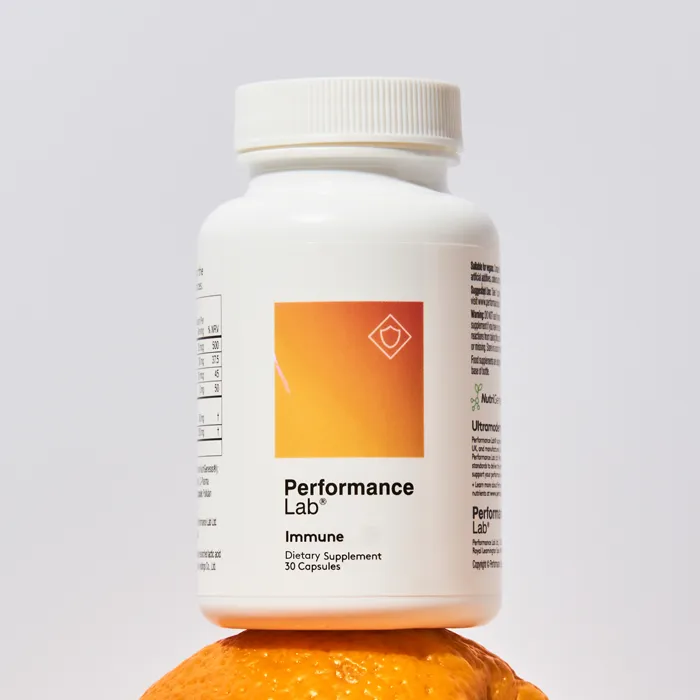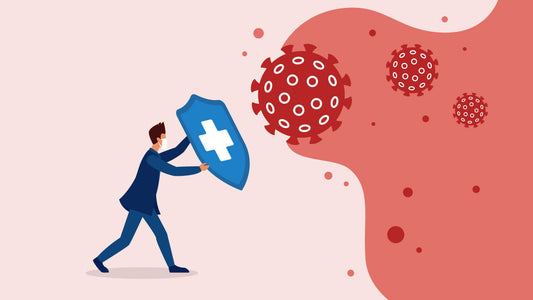Pollen allergies, or hay fever, are amongst the most common types of allergies experienced worldwide. With summer in full swing and pollen drenching the air, millions around the globe begin to suffer from the unpleasant symptoms - itchy eyes and throat, a stuffy nose, constant sneezes, you name it.
But this is just one example. People can develop allergies to pretty much anything. Once the immune system decides it doesn’t like a substance, you will experience an allergic reaction each time you come into contact with it. It can sometimes even be life-threatening, such as with nut allergies.
But what causes allergies in the first place? And are they a sign of a strong immune system? Find out the answers to these questions in this article and read our top immune-boosting tips!
Key Takeaways
- Allergies happen when your immune system overreacts to harmless substances like pollen, pet dander, or certain foods.
- They are not a sign of a weak immune system; if anything, they reflect an oversensitive immune response that is very active.
- Some research suggests people with allergies may have lower risks of certain cancers, although the link is not fully understood.
- You cannot switch off an allergy, but you can support overall immune health with a nutrient rich diet, a healthy gut, regular exercise, and quality sleep.
- Immune focused supplements can help fill nutrient gaps so your defenses stay strong year round.

Why Do Allergies Exist?
Our immune system keeps us healthy by defending us from harmful microorganisms that could make us ill, such as bacteria, viruses, and parasites.
Allergies arise when the immune system reacts inappropriately to an otherwise harmless substance. These triggers vary between individuals and are known as allergens 1.
In a normal immune response, when a harmful microbe enters the body, the immune system reacts by producing substances called antibodies which label the foreign molecule as dangerous. This signals to immune cells known as T cells to kill the invader.
Most of the time, our bodies don’t react to the presence of allergens. But in some individuals, the immune system perceives certain substances as a threat, even though they aren’t. As a result, immune cells produce antibodies to kill the allergen, and an unnecessary inflammatory response is launched.
When you are first exposed to an allergen, and an immune response is launched, the body becomes sensitized to that particular substance. This means it keeps a memory of it so that when it next comes into contact with it, the immune system recognizes it as harmful and quickly attacks.
Allergies manifest in many different ways depending on the allergen. Common allergies include asthma, hay fever, and pet allergies. Symptoms vary and can include inflammation, sneezing, congestion, trouble breathing, itchy eyes or throat, and anaphylaxis in the worst cases.
Allergies are prevalent and are on the rise, especially in children. It is estimated that around 400 million people globally are affected by hay fever, 300 million have asthma, and 200-250 million have food allergies 2.
A Sign Of A Strong or Weak Immune System?
Many people believe allergies are a sign of a weak immune system - this is not true! If anything, it is the opposite. The fact that your immune system is reacting to allergens indicates it is working and doing its job to fight against invaders.
Obviously, this is a good thing if the invading molecule is harmful and may make us sick. However, when it responds the same way to a harmless allergen, it is an unnecessary overreaction.
Therefore, allergic reactions are better described as an oversensitive immune system that is misfiring rather than not functioning correctly.
Some scientists argue allergies are actually indicators of stronger immune systems and that people with allergies may have immune systems that are more effective at identifying and eliminating cancer-causing toxins.
According to one study, people without allergies may be 50% more likely to develop glioma, a type of brain tumor 3. Another study found that people with hay fever and asthma were less likely to die from colorectal cancer 4.
Ways To Boost Your Immune System
Unfortunately, there isn’t really anything you can do to alter your body’s immune response to allergens. However, you can take steps to boost the overall effectiveness and function of your immune system. Follow the tips below to help strengthen your body’s natural defenses!
1. Eat your five a day
A healthy diet is one of the best ways of supporting the immune system - there’s a reason you’re told it’s essential to get your five a day.
Fruits and vegetables contain antioxidants that help protect the body from harmful free radicals. These are highly-reactive molecules in the body that can cause cell damage and create inflammation, which increases the risk of disease.
Fruit and veg are also rich in essential vitamins and minerals, like vitamin C, which help the immune system fight off illness 5. They also contain plenty of fiber, which feeds the good bacteria in your gut.
Research suggests a healthy gut microbiome improves your immune system and helps prevent harmful microbes from entering the body through your digestive tract 6.
2. Take dietary supplements
Obtaining adequate amounts of the required nutrients for optimal immune function is challenging through diet alone. That’s where supplements come in!
Performance Lab NutriGenesis Multi is specially tailored for the nutritional needs of men and women, providing all the essential vitamins and minerals for better immune health.
Then there's Performance Lab Immune, which provides key nutrients that enhance immune cell function and boosts your natural immune response.
3. Exercise
Regular exercise can lower the risk of disease by reducing inflammation and promoting the regeneration of healthy immune cells. Research suggests that just one session of moderate exercise is enough to improve immune health! 7
Regular exercise can have profound effects on the function of your immune system and alongside a healthy diet, is a great way to boost your immune system.
4. Get enough sleep
It is recommended that adults get between 7-9 hours of sleep a night. Not meeting this requirement weakens the immune system because the body has not had a period of rest to restore its defenses and produce new immune cells.
Studies have found a link between a lack of sleep and an increased risk for illnesses like the common cold 8.
Conclusion
Allergies result from the immune system mistakenly recognizing harmless substances as dangerous and unnecessarily launching an immune response. This is beneficial when the foreign molecule can actually make us ill, but when it is harmless, we suffer from the symptoms of allergies like hay fever and asthma.
Allergies are not a sign of a weak immune system. On the contrary, it is believed they are, in fact, a sign of a strong immune system that is just overreacting.
Maintaining a healthy immune system can help your body efficiently and effectively fight off disease. Eating a healthy diet combined with exercise, plenty of sleep, and nutritional supplements can ensure it functions at optimal capacity.
References
- Reynolds, Lisa A., and B. Brett Finlay. "Early life factors that affect allergy development." Nature Reviews Immunology 17.8 (2017): 518-528.
- Pawankar, Ruby. "Allergic diseases and asthma: a global public health concern and a call to action." World Allergy Organization Journal 7.1 (2014): 1-3.
- Schwartzbaum, Judith, et al. "Association between prediagnostic IgE levels and risk of glioma." Journal of the National Cancer Institute 104.16 (2012): 1251-1259.
- Ma, Wangqian, et al. "Association between allergic conditions and colorectal cancer risk/mortality: a meta-analysis of prospective studies." Scientific reports 7.1 (2017): 1-7.
- Hemilä, Harri, and Elizabeth Chalker. "Vitamin C for preventing and treating the common cold." Cochrane database of systematic reviews 1 (2013).
- Holscher, Hannah D. "Dietary fiber and prebiotics and the gastrointestinal microbiota." Gut microbes 8.2 (2017): 172-184.
- Simpson, Richard J., et al. "Exercise and the regulation of immune functions." Progress in molecular biology and translational science 135 (2015): 355-380.
- Prather, Aric A., et al. "Behaviorally assessed sleep and susceptibility to the common cold." Sleep 38.9 (2015): 1353-1359.
















